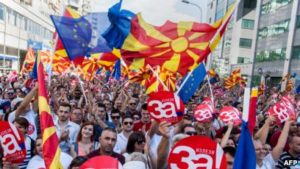NATO Macedonian’s march for Name Changing
Thousands March In Macedonia In Favor of Name Change, NATO, EU Membership.
People wave Macedonian and European flags as they attend a campaign rally in Skopje on September 16 for a “yes” vote ahead of a referendum scheduled for later this month.
Thousands of Macedonians marched in the capital, Skopje, in support of a move to change the country’s name and for eventual NATO and European Union membership.
The demonstrators urged a “yes” vote in the September 30 referendum that will ask if Macedonians want to change the name of their Balkan country to North Macedonia.
The referendum follows an agreement with neighboring Greece to end a decades-long dispute over the country’s name.
The dispute dates back to 1991 when Macedonia peacefully broke away from Yugoslavia, declaring independence as the Republic of Macedonia.
Greece has objected to the name Macedonia, saying it implies territorial claims on the northern Greek region with the same name.
Greece, an EU and NATO member, has cited the dispute to veto Macedonia’s bid to join the two organizations.
Pro-Europe Prime Minister Zoran Zaev addressed the marchers in front of the EU office in the capital, calling the “historic” deal “fair.”
“The message is: We want the future. We want a European Macedonia! It is our responsibility to secure a future for our children and their children,” Zaev said.
“EU and NATO is the safe road. For us, there is no other alternative. That’s our guide for a better life,” he told the crowd.
Zaev faces domestic opposition to the name change, mainly from nationalists among the country’s 2.1 million people.
Opposition party VMRO-DPMNE held its own rally on September 16 in the eastern town of Stip to urge a crowd of about 2,000 people to reject the name change.
Opposition leader Hristijan Mickoski told the crowd the government is “taking advantage of the Macedonian people’s strong will to achieve European standards, true prosperity, stability and security, to push an agenda that is against our state and national interests.”
The official referendum question will be: “Are you for EU and NATO membership by accepting the agreement between the Republic of Macedonia and the Republic of Greece?”
Opinion polls have shown the “yes” vote with a clear lead, but it will require a turnout of more than 50 percent of the Balkan nation’s 1.8 million registered voters to be valid.
U.S. officials, including President Donald Trump, and other Western leaders have urged Macedonians to accept the name change.
European Union foreign policy chief Federica Mogherini on September 13 urged Macedonians to vote yes in the referendum, saying they “hold the key to the future” of their country.
U.S. Secretary of Defense Jim Mattis was due to arrive in Skopje on September 16 to “show U.S. support for Macedonia during NATO accession and continued U.S. commitment to peace and security in the region,” according to the Defense Department.
Speaking to reporters on September 11, Mattis said he was concerned about alleged acts of “mischief” by Russia to try to block Macedonia’s path to NATO membership.
Moscow denies claims of interference but opposes NATO expansion eastward.




